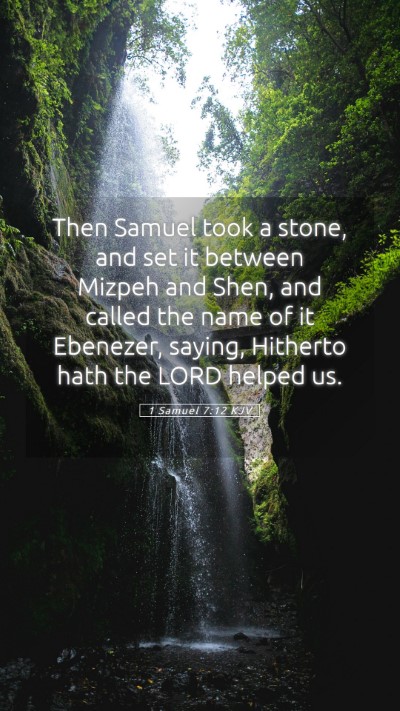Bible Verse Exploration: 1 Samuel 7:12
Verse: “Then Samuel took a stone and set it up between Mizpah and Shen and named it Ebenezer, saying, ‘Thus far the Lord has helped us.’”
Understanding the Significance of 1 Samuel 7:12
This profound verse captures a pivotal moment in Israel's history and symbolizes the faithfulness of God towards His people. Below is a comprehensive exploration of its meaning and implications drawn from public domain commentaries such as those by Matthew Henry, Albert Barnes, and Adam Clarke.
Bible Verse Meanings and Interpretations
- Physical Representation: Samuel's act of setting up a stone, named Ebenezer, serves as a tangible reminder of God's help. The physical act conveys a deep spiritual truth—God's guidance in Israel's journey.
- Historical Context: This event occurs after Israel experiences military victory against the Philistines, marking a significant change in the nation’s fortunes. It reflects a response to God’s intervention during a time of need.
- Spiritual Significance: The name Ebenezer means "stone of help." This indicates not only gratitude but also recognition that all success stems from divine assistance. It urges believers to acknowledge God’s support in their lives.
- Continuity of God's Help: The phrase "Thus far the Lord has helped us" emphasizes both past and ongoing assistance from God. It suggests continuity in God's covenant relationship with His people, reminding us to trust in God's everlasting presence.
In-Depth Bible Verse Analysis
This verse finds its roots in the broader narrative of Israel’s journey and is pivotal in teaching about God's unchanging nature. Commentators analyze the depth of the name ‘Ebenezer’ as it resonates through spiritual and historical lenses:
- Matthew Henry: He underscores the importance of public acknowledgment of God's past mercies, seeing the stone as a beacon of hope and encouragement for future generations.
- Albert Barnes: Barnes points out that this stone serves as a reminder to Israel of their need for divine help, urging the people to remember and reflect upon God's faithfulness in their communal life.
- Adam Clarke: Clarke elaborates on the significance of naming the stone. He notes the tradition of commemorating God’s actions, a practice that encourages believers to reflect on times when God intervened in their lives.
Application of 1 Samuel 7:12 in Daily Life
Implementing the insights from this verse involves a blend of remembrance and gratitude:
- Personal Remembrance: Believers can set up ‘Ebenezers’ in their own lives, whether through journaling, memorials, or other reminders of God's interventions and assistance in their circumstances.
- Community Testimonies: Sharing stories within Bible study groups or online Bible studies about personal experiences of God's help can serve to strengthen faith and foster community.
- Prayerful Reflection: Individuals can use this verse in their prayer life, asking God to continue guiding them, reflecting on how far they’ve come with His help.
Cross References
This verse connects with various other passages in the Bible, enhancing its understanding:
- 1 Samuel 4:3-11: Highlights Israel's initial struggle against the Philistines, setting the backdrop for their ultimate victory.
- Psalms 78:35: Reminds Israel of God being their Rock and Redeemer, reflecting similar themes of divine aid.
- Exodus 17:15: In which Moses built an altar naming it Jehovah Nissi, symbolizing God as a banner for His people in battle.
Conclusion
1 Samuel 7:12 is a powerful scripture that encourages believers to recognize God's unwavering support throughout their lives. Through a detailed examination of the verse, we understand that its essence lies not only in historical context but also in its application to modern faith journeys. Whether embarking on a personal Bible study or engaging in group discussions, reflecting on the meanings and interpretations of such verses deepens our comprehension of Scripture and enriches our spiritual lives.


